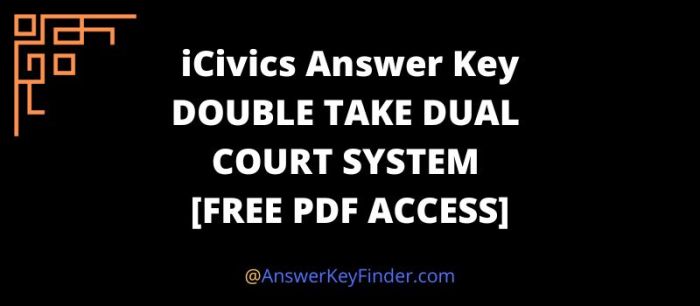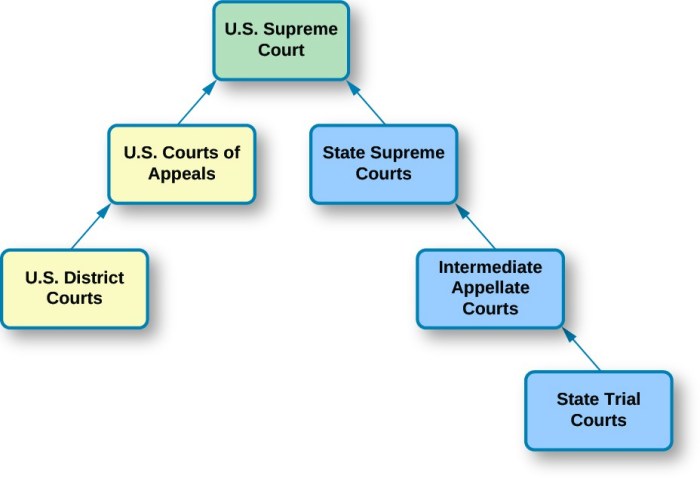Delve into the intricacies of the American judicial system with the “Double Take Dual Court System iCivics Answer Key.” This comprehensive guide unlocks a deeper understanding of the dual court system, its historical evolution, and its impact on contemporary legal challenges.
As we embark on this journey, we will explore the unique jurisdictions, structures, and procedures of state and federal courts, shedding light on the intricate interplay between them. Through a comprehensive analysis of key Supreme Court cases, we will trace the historical development of the dual court system and its enduring legacy.
Double Take: The Dual Court System

The United States has a dual court system, meaning that there are two separate court systems that operate in parallel: the state court system and the federal court system. Each system has its own jurisdiction, structure, and procedures.
State courts handle the vast majority of cases in the United States, including criminal cases, civil cases, and family law cases. Federal courts handle a smaller number of cases, but they have jurisdiction over cases that involve federal law, such as bankruptcy, antitrust, and patent law.
Advantages of the Dual Court System
- The dual court system allows for a more efficient and specialized handling of cases.
- State courts are more familiar with local laws and customs, which can lead to more just outcomes.
- Federal courts provide a check on the power of state courts, ensuring that state laws do not violate the U.S. Constitution.
Disadvantages of the Dual Court System
- The dual court system can be confusing and expensive for litigants.
- There is the potential for conflicting rulings between state and federal courts.
- The dual court system can lead to delays in the resolution of cases.
ICivics Answer Key: Double Take Dual Court System Icivics Answer Key
The iCivics website provides free online resources for teaching and learning about civics and government. The iCivics answer key provides the answers to the questions in the iCivics lessons.
How to Access the iCivics Answer Key
- Go to the iCivics website.
- Click on the “Educators” tab.
- Click on the “Answer Keys” link.
Benefits of Using the iCivics Answer Key
- The iCivics answer key can help students check their understanding of the material.
- The iCivics answer key can help teachers save time by not having to create their own answer keys.
- The iCivics answer key can help parents help their children with their civics studies.
Historical Development of the Dual Court System

The dual court system in the United States has its origins in the English common law system. When the American colonies were founded, they adopted the English common law system, which included a dual court system.
The dual court system was formally established in the United States Constitution. Article III of the Constitution creates the federal court system, and the Tenth Amendment reserves all other powers to the states, including the power to create state courts.
Evolution of the Dual Court System
The dual court system has evolved over time through Supreme Court decisions. In the case of Marbury v. Madison(1803), the Supreme Court established the principle of judicial review, which gives federal courts the power to declare laws unconstitutional.
In the case of McCulloch v. Maryland(1819), the Supreme Court established the principle of federal supremacy, which gives federal law precedence over state law in cases of conflict.
Impact of Supreme Court Cases
These Supreme Court cases have had a significant impact on the development of the dual court system. They have established the federal courts as the final arbiters of the Constitution and have given the federal government the power to override state laws in certain cases.
Comparison of State and Federal Courts

| State Courts | Federal Courts | |
|---|---|---|
| Jurisdiction | Handle the vast majority of cases in the United States, including criminal cases, civil cases, and family law cases. | Handle a smaller number of cases, but they have jurisdiction over cases that involve federal law, such as bankruptcy, antitrust, and patent law. |
| Structure | Vary from state to state, but typically have a trial court, an intermediate appellate court, and a supreme court. | Have a three-tiered structure: district courts, circuit courts of appeals, and the Supreme Court. |
| Procedures | Vary from state to state, but typically follow the common law system. | Follow the federal rules of civil procedure and the federal rules of criminal procedure. |
Examples of Cases
- State courts: Murder, robbery, assault, battery, divorce, child custody
- Federal courts: Bankruptcy, antitrust, patent law, copyright law, civil rights
Role of the Supreme Court, Double take dual court system icivics answer key
The Supreme Court has the power to resolve conflicts between state and federal courts. The Supreme Court can review decisions of state courts to ensure that they are consistent with the U.S. Constitution and federal law.
Contemporary Issues in the Dual Court System
The dual court system faces a number of challenges today, including:
- The increasing complexity of the law
- The growing number of cases
- The lack of funding for the courts
There have been a number of proposals for reforming the dual court system, including:
- Creating a national court of appeals
- Merging state and federal courts
- Increasing funding for the courts
Thoughts on the Future of the Dual Court System
The future of the dual court system is uncertain. However, it is clear that the system faces a number of challenges. It is important to consider these challenges and to develop solutions that will ensure that the dual court system remains a fair and efficient way to resolve disputes.
Clarifying Questions
What is the purpose of the dual court system?
The dual court system ensures that both state and federal laws are upheld and provides a forum for resolving disputes between citizens and the government.
How can I access the iCivics answer key?
The iCivics answer key is available online at the iCivics website.
What are the advantages of using the iCivics answer key?
The iCivics answer key provides students with immediate feedback on their understanding of the material and helps them identify areas where they need additional support.